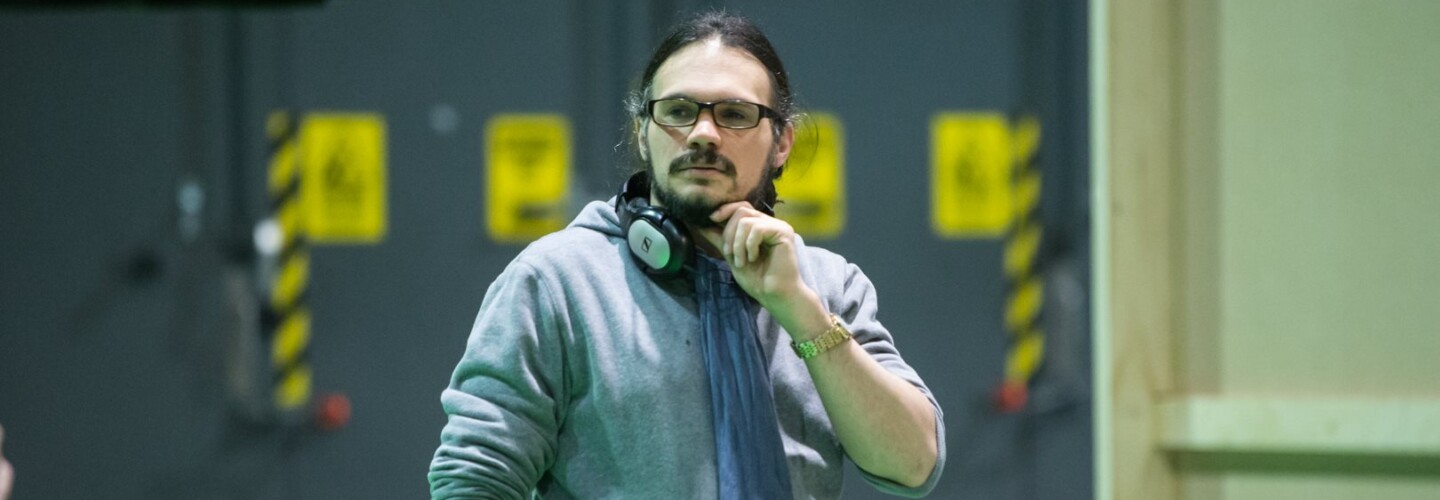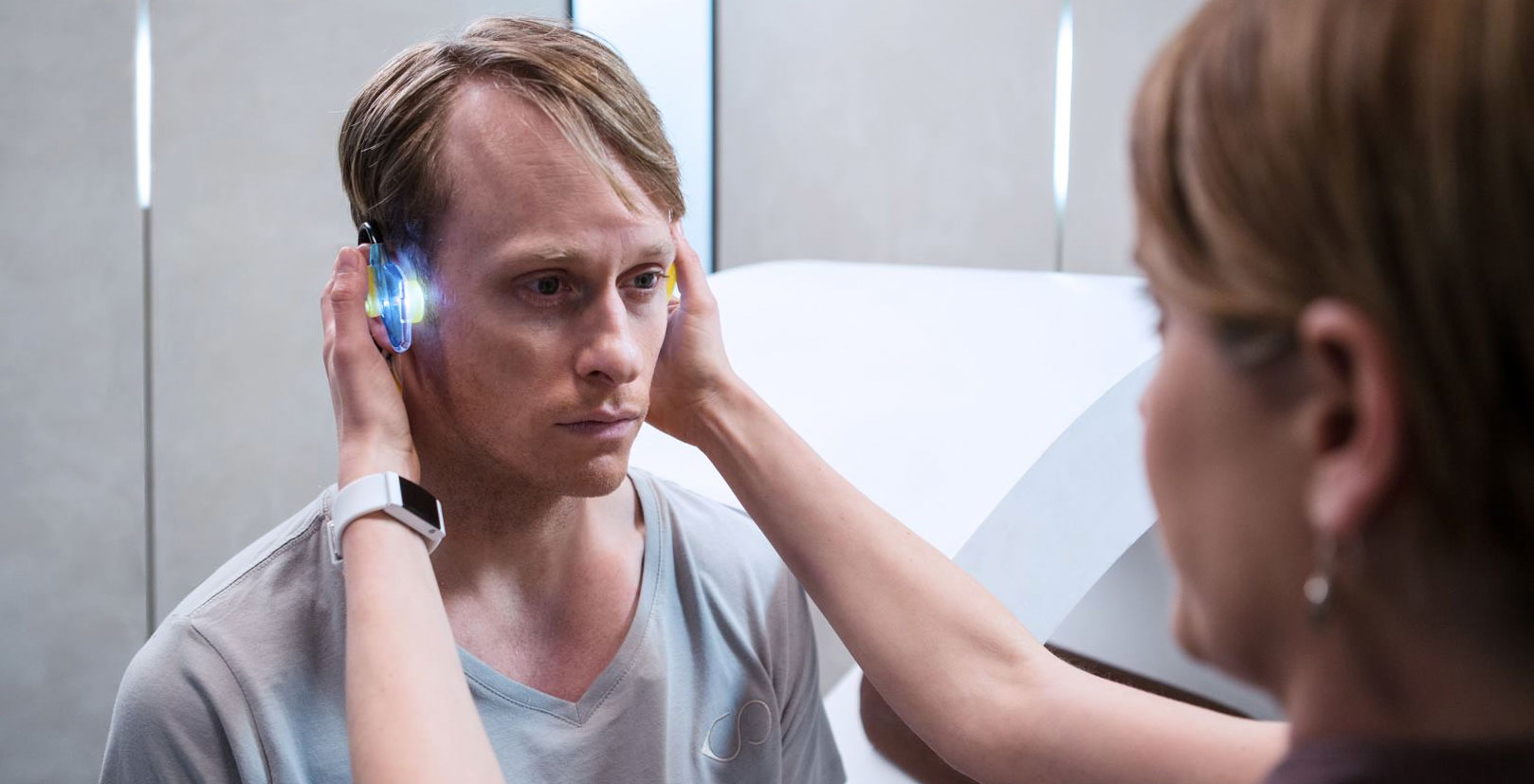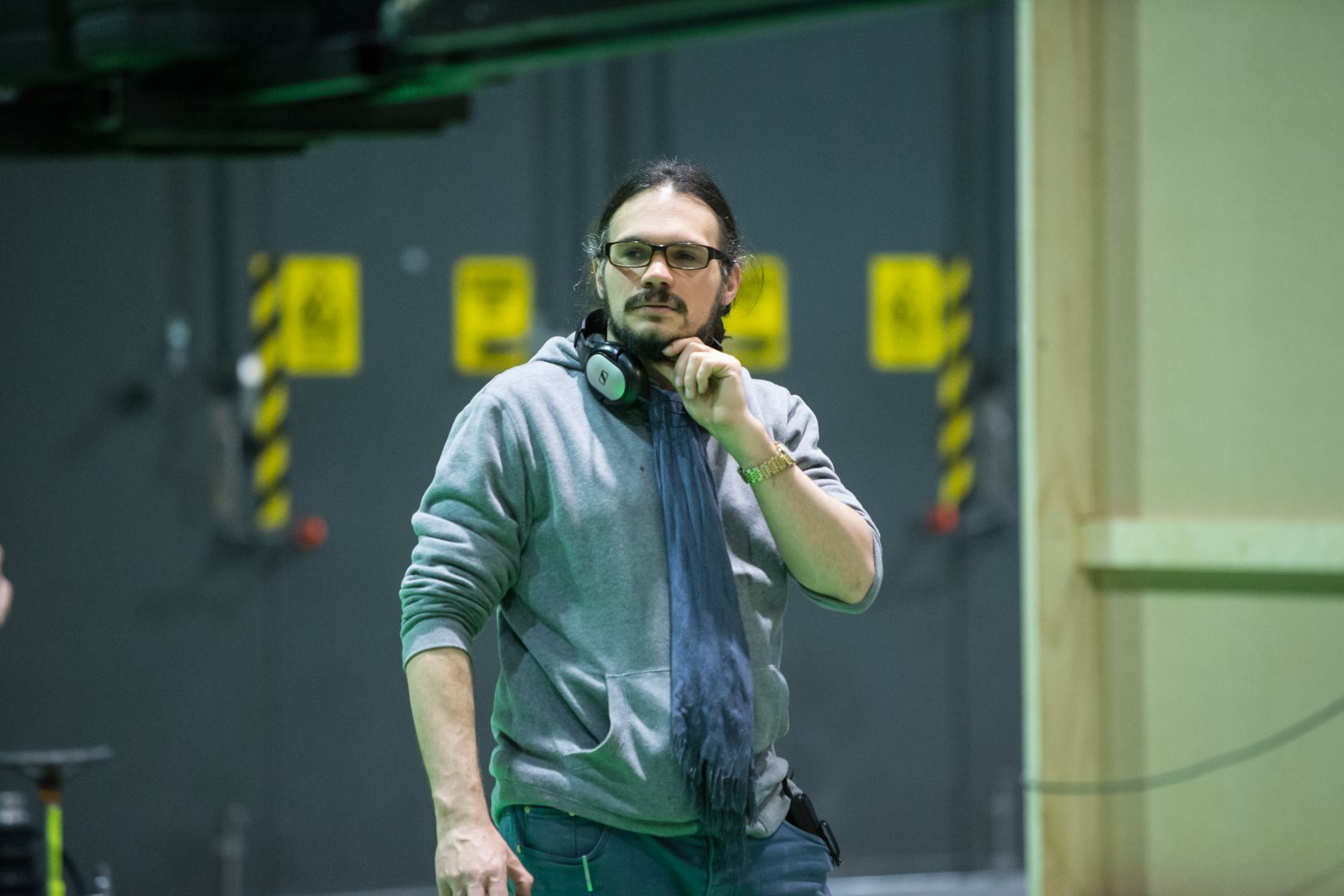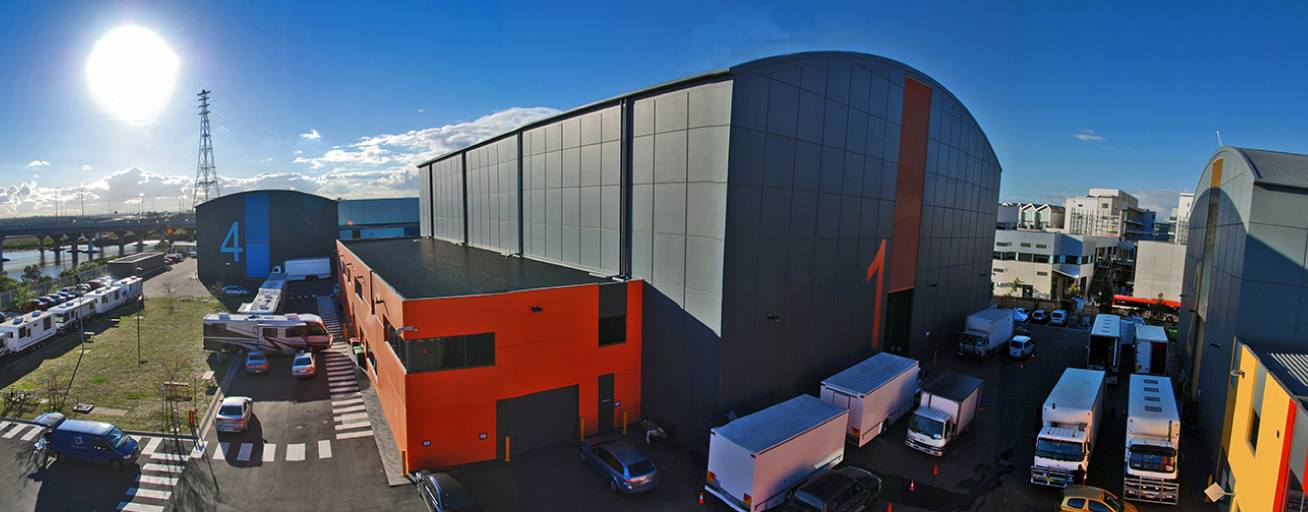Having featured, what we described as a ridiculously ambitious graduation short, Payload back in 2012, we always knew Stu Willis would be a filmmaker we’d be welcoming back to the DN fold in the future. Introducing us to his assured, character-driven approach to science fiction in this 18-minute tale of a family living in the shadow of a space elevator, it was pretty obvious for everyone at DN HQ that this wasn’t a here-today, gone tomorrow kind of filmmaker. This was a man who loved his craft, showed real passion for his chosen genre and most importantly – put narrative first! We’ve been patiently waiting to see what director Willis would put his hand to next and earlier this year he finally let the world in on his plans when he took to Kickstarter to raise funds for his latest project Restoration.
Introducing the World of Restoration
2019. A company – Restoration Life Services – offers individuals the service of having their memories downloaded for backup. So, in the event of death, those memories can be uploaded into a new body, a generic host, nicknamed a “jerry”. After a routine backup, Oliver Klein wakes up to find that his memories have been restored into a body that is not his own. Trapped in this foreign body, Oliver Klein struggles to reconnect with his family and his life, and must come face-to-face-with the truth that he is not the only Oliver Klein. And this foreign body? It has its own “muscle memory”. Soon, Oliver discovers that he is capable of doing things the original Oliver never could and never would.
Video created for the Restoration team’s Kickstarter pitch
Having recently been featured in Empire magazine, director Willis was kind enough to grant DN a sneak peek behind the production of Restoration and talk to us about his concept, shoot and distribution plans for the project:
Reading the synopsis for the story of Restoration I was instantly attracted to the themes of immortality and identity set in a dystopian world – can you tell us a bit about how the narrative originated? Were there any existing works that inspired the story?
Well, y’know, I don’t think it is a dystopian world. It’s a very near future world with a form of immortality – kinda interesting that you feel that makes it dystopian… I think there’s hints towards the negatives around this kind of immortality, but we’re actually focused on a pretty personal tale in Restoration rather than something at the social level.
The sci-fi concept behind it was inspired by smartphones. We – at least in the first world – are pretty used to having our phones constantly backed up. So if we lose them, we can just ‘restore’ from a backup and it feels like we never really lost the phone. So we asked ourselves, what would it mean if you could do that with people? We kept on toying with the idea but never really had a good basis to build it upon… until…
Matthew and I were both living away from our partners last year. When it was coming close to the time to return home, we got talking about how weird the first month-ish is – how it feels like you’re a stranger in your own house, that you need to relearn the dynamics of your relationship, and yourself too. And, with that, we realised we had the emotional core for what could become Restoration: that sense of alienation.
We are in a tradition of sci-fi stories that deal with the importance of memory and identity, but the difference is that we place a huge amount of importance on the body. If you put the memories of a concert pianist in my body, there’s no guarantee they could actually play that well, they’d just have the memory of playing well…
In many ways ‘Restoration’ isn’t just a sci-fi with soul, but sci-fi about soul.
I know we joke about my love for the term but on Kickstarter you once again use the description “sci-fi with a soul” to portray the importance of character in your work. As with Payload, can we expect another character-driven piece and do you think it’s important in a genre saturated with FX-driven films for filmmakers to tell these kinds of stories?
Absolutely! In many ways Restoration isn’t just a sci-fi with soul, but sci-fi about soul. The philosophical question it asks is “where does the soul reside?” Is it in our body? Is it in our mind? Our memories? Our families? Does it even exist? That’s a pretty existential question, I know, but when you really pick at it it can be a horrifyingly confronting question; e.g. if my memory is wiped, how is that different from killing me? For us, Restoration is really a kind of psychological body horror. You can’t easily ask or answer that question without focusing on character. But we aren’t mediative at all, we’ve dramatised it through a (hopefully) compelling and propulsive thriller.
I think filmmakers and storytellers should make the kind of films that speak to them. To paraphrase Greg Egan (a brilliant Australian SF writer), writing about the beauty of quantum mechanics, the birth of a star or the intricacies of a technology is just as worthy as writing about people. He was saying that in defence of hard-SF, but I think it’s true of… well… all art. Narrative is a dominate form because humans are pattern-seeking animals, but I think it limits us to see narrative as a requirement for films/filmmaking. Ultimately, I think we – as an audience – respond to films because they give us personal pleasure. Whether it be the pleasure of spectacle, the pleasure of emotional catharsis, or the pleasure of intellectual snobbery and so on. So, for me, the best thing is people make the kind of things that give them pleasure because then they’re going to do it as best they can.
For me, I love character-driven genre. It is what I enjoy making, and what I enjoy watching. But it is also important to me that I make it because it allows me to express/push my worldview. I believe that humans are animals who are shaped by their environments, yet who are also capable of shaping that same environment. That’s a powerful and dangerous feedback loop. To come full circle, what does the question “where does the soul reside” even mean if we are animals without souls?
Director Stu Willis on the Restoration set at Docklands Studios, Melbourne.
We live in a science-fiction present.
We first became aware of your work through the sci-fi short Payload and now Restoration sees you working in that genre again…what is it about science fiction that makes you want to keep telling stories in this arena?
We live in a science-fiction present. There are satellites in space that can pin point your position on the Earth below within a couple of meters. We have remote controlled flying helicopters you can buy from toy stores. We have printers that can print organs. We have cars that can drive themselves. The Season 2 finale of Girls has Adam running to Hannah’s apartment while on a video call being made over wireless transmission from his pocket computer. If you put that in a movie 20 years ago, it would’ve been science-fiction.
But the thing is we’ve always lived in a science-fiction present. Technology is a fundamental part of the human condition: if not the foundation itself. Technology shapes who we are: individuals and society. I don’t mean this in a small way, I mean this in a big way. Cooking is technology. The written word is technology. Houses are technology. The Printing Press. The Steam Engine. Laws. Government. Medicine. Agriculture. All these are technology and have utterly shaped and reshaped who we are. There is nothing natural in any of this.
So as a storyteller who explores the human condition, I cannot ignore the role of technology in how it shapes who we are. That’s the science part; what about the fiction part? Well, that means we distance ourselves from reality and make something entertaining! What other genre lets you do that? Wanna talk about rascism? District 9. The Vietnamese war? Aliens. Thatcherism? Snowpiercer. And so on! How awesome is that?! In our case, we can take a question as philosophical as ‘where does the soul reside’ and twist into a dark, brooding thriller.
From following the developments of Restoration it looks like you’ve put an incredible amount of work into the pre-production stage. How important is this process for you as a filmmaker in not only preparing for the work to come, but in forming and building universes and characters for your story?
I don’t think you make a film as much as you grow a film. It’s an organic process. Pre-production is a huge part of that for me. It’s about exploring, discovering, and trying stuff to see how it feels before you get onto set. And that helps you become more specific with what you need to decide at this stage of the process: this location over that location, this prop over that prop. For example, because we’ve decided on this location (say a flat with polished concrete floors), this grey jacket is now the right choice for this character because they’re connected colour wise.
So in pre-production you have to be mindful of how connected every decision is. Otherwise you’ll find yourself committed to something that doesn’t fit and the ideas/feelings/themes become a little muddier. And sometimes that means responding to what you have, not what you wished you had.
And then once you’re on set, you do the same all over again; exploring, discovering, trying things out, and seeing what fits (and doesn’t fit – which is just as informative). Each new take it becomes more specific again. And the same thing happens when you’re in the edit. And sound edit. And mix. And grade. Until all you’re left with is the final film. A highly specific expression. And it’s that journey to specificity that builds your universe and world.
What can you tell us about the visual approach for the film? What kind of tone are you setting through the aesthetic?
I wanted to move away from my usual ‘Deliberate’ style as it felt right for the material. So I’ve let go. The camera is always restless: handheld, steadicam, dolly, bungee, or cinesaddle. We wanted a sense of unease and voyeurism to permeate through everything. And so our our shots respond to the performances, not the other way around. While our lighting is inspired by film noir, we wanted our actors to have freedom to move around to be looser and off-balance. This means the film is rougher, visually, than my previous work. But that gives a real energy to what is on screen.
Kickstarter funds allowed Willis and his team to build the the main set of Restoration Life Services at Docklands Studios, Melbourne.
Kickstarter is about audience-building more than finance.
You raised money for the film through Kickstarter – how did you find that process and what have those funds meant for the production?
Really, KS is about audience-building more than finance. Although, the KS funds allowed us to, quite literally, build the set we needed. Yet we also met crew through the KS. It raised awareness throughout the local indie film community in Melbourne and people reached out to us. Some were generous enough to back the film AND volunteer to work on it. Legends. KS also gives us an accountability to someone outside the production. It is kinda a weird feeling, but in the dark moments (and we all have them) I remind myself that there are over 200 people who want us to succeed… and that allows you to shift your focus from the self to others.
Restoration is set to be a 3 episode web series, what made you want to tell the story in this format and what plans do you have for the release of the 3 episodes?
When we started writing the script was growing past 20 minutes and we were like “what do you do with a 20 minute film?” (SOTW’s long shorts aside). So we took inspiration from True Detective and the idea of episodic, but self-contained, stories. But as we are now in post, the dramatic shape is a little different, and it may become a 4 part series – or a 2 part – or remain as a 3 part. We’re still nutting that out. We just wanted something that was flexible in terms of delivery. Which is also why we describe it as an online miniseries, not a web series. Web implies YouTube and, maybe these days, Vimeo. Online is much broader…
When can we expect to see Restoration released?
We’re aiming for the release to be around May, 2015. But we’re not quite sure what that release is going to look like, yet.









